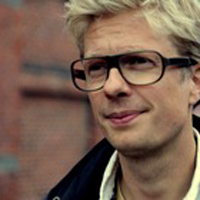Research spotlight #27: Kristian Tylén
Associate professor of Cognitive Science Kristian Tylén tells us about his background and current projects

Hi Kristian, what is your background and job role at AU?
I am Danish, actually born in Aarhus and grew up on Djursland/Mols. I started my university career studying Russian language and literature. I was very fond of the classics (Dostoevsky, Tolstoy, etc.) and did some part time work as an interpreter. However, through my interest in literary analysis I also became interested in semiotics (the study of signs and meaning). At this time there was a very active environment around the Center for Semiotics (at that time a Danish National Research Foundation Center of Excellence). Researchers/teachers at the center combined new insights from the cognitive sciences and cognitive linguistics with the more traditional humanistic study of meaning. It was an inspiring time and environment that sparked my interest in human cognition and behaviour. After graduating with a MA in Cognitive Semiotics I went to the University of Southerns Denmark for my PhD. During the PhD, I started working with fMRI brain imaging and behavioural experimentation, and I became affiliated with CFIN and later the Interacting Minds Group (what has later become the Interacting Minds Centre).
I am an associate professor in Cognitive Science employed by the Department of Linguistics, Cognitive Science and Semiotics.
What are your main areas of research?
My main areas of research concerns human meaning making as it unfolds in contexts of social interaction, collective problem solving and dialogue. Using mainly behavioural experimentation, I study what happens when people collaborate, when they are successful, and what aspects of their interactions predict success.
Apart from this, I am also interested in aspects of cultural and language evolution; how we through social interaction and learning evolve cultural procedures and products that come to scaffold our behaviour in a dynamic way. A part of this research is thus trying to experimentally simulate processes and mechanisms that shape human cognition and behaviour on historical and evolutionary time scales.
Last but not least, I am current involved with two intriguingly interesting research projects: the Danish Council for Independent Research's project The Puzzle of Danish with Morten Christiansen (PI) among others, and the EU ITN project DCOMM (Deictic communication) with Kenny Coventry (PI), Mikkel Wallentin and others.
The Puzzle of Danish is motivated in the curious observation that Danish might be an exceptionally hard language to learn even for Danish children due to its opaque sound structure. In the project, we use behavioural experiments to investigate if the sound structure of Danish courses challenges for linguistic processing in adult speakers of Danish compared to Norwegian which is characterised by a much more transparent sound structure.
The DCOMM project investigates one of the most fundamental aspects of human communication, the way we use pointing and demonstratives such as 'this' and 'that' to share attention with our interlocutors. Again we rely on various form of behavioural and brain imaging experiments to map the contextualised meaning and underlying processing of these very frequent words.
Are you involved with any teaching at the moment?
I have been part of establishing the new degree programs in Cognitive Science (BSc and MSc) and taught courses in Experimental Methods (stats and programming), and Communication and Cognition. However, at the moment I am enjoying a research sabbatical.
How did you hear about Cognition and Behavior Lab?
I was involved from the early stages of planning and designing the facility.
Have you used the Lab? If so, what are the benefits for researchers?
I think I have pretty much used all the facilities of COBE doing anything from simple behavioural studies with an individual in from of a desktop computer, to large networked designs, having people navigate giant touch screens, VR, etc.
Is there a particular recommendation you would like to pass on to other researchers? Something you wish you had known before you started, or just a useful trick.
Collaborate with other people. Especially people with other experience and perspectives on things.
Could you recommend one academic book to fellow colleagues that you think is of great interest?
I really do not read a lot of academic books these days. Almost exclusively journal articles (and a bit of fiction). The last book I read from page 1 till the end was Scott Kelso's "Dynamic Patterns", which I enjoyed.
Away from your research, what do you enjoy doing?
I play a lot of music, jazz, funk, rock.
Finally, which Associated Researcher would you like to see under 'Spotlight' next time?
Roberta Rocca